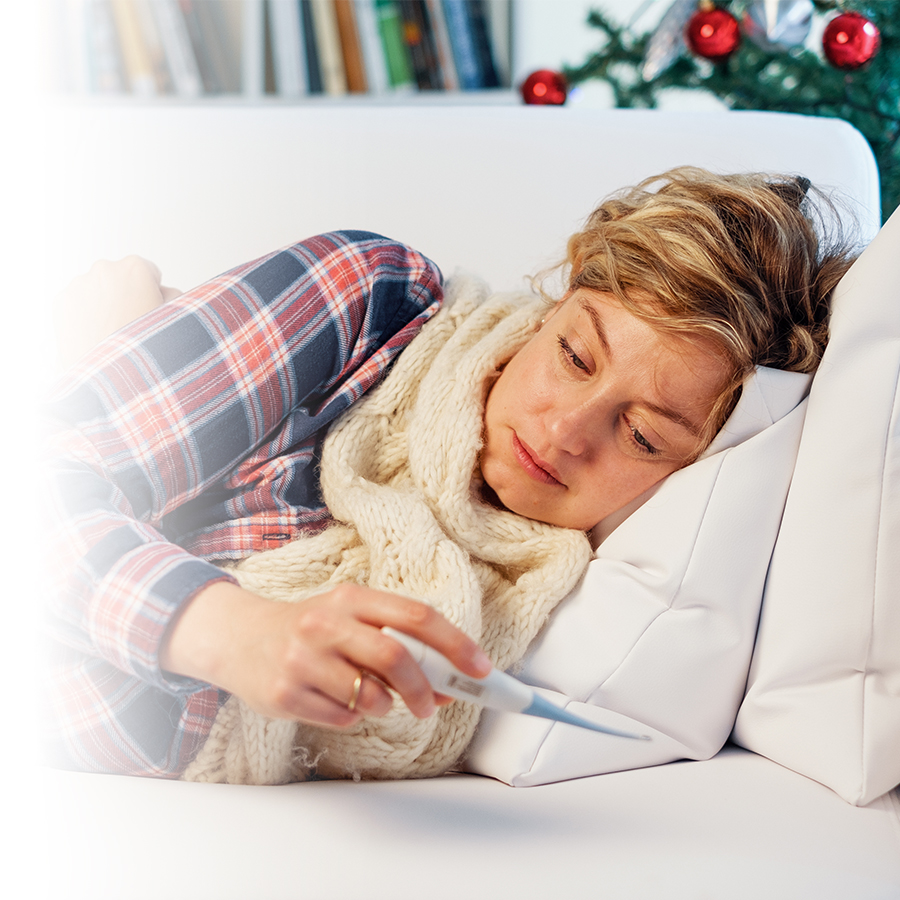The holiday season is a time conducive to the spread of viruses. There are many ways to protect against them.
The holidays... and viruses!
The holiday season is synonymous with merriment, not only for humans, but for germs as well! The large number of get-togethers make it very easy for these unwelcome guests to crash the party without a formal invitation! They take advantage of close contact such as hugs, kisses, and handshakes to spread from one person to the next. The result: an infection that wasn't on your gift list!
When your health isn't up to par during the holidays, you don't feel much like celebrating. You're also less excited by the prospect of a new year filled with possibilities. Fortunately, there are ways to avoid getting sick during this crucial time.
The holiday "classics"
Some types of infections are almost an integral part of the holiday tradition. These include the common cold, the flu, RSV infection, gastroenteritis and cold sores.
The common cold is a relatively mild respiratory infection, affecting mostly the nose and throat. It can cause nasal congestion, sneezing, coughing, sore throat, fever, etc. and usually lasts 10 to 14 days.
The flu is a more serious infection and a greater health threat. It is caused by a virus called influenza. Symptoms include high fever, general malaise, aches and pains, severe cough, severe fatigue, etc. There are many reported cases of the flu at the beginning of the year, after the holidays.
The respiratory syncytial virus (RSV) is a highly contagious microbe that can easily spread during the holiday celebrations. Infection with this virus can go unnoticed or cause cold-like symptoms. In babies, young children and other vulnerable people, the infection can be more severe and cause respiratory distress, which may require hospitalization.
Gastroenteritis is an infection of the digestive tract that causes inflammation of the stomach and intestines, followed by symptoms of nausea, vomiting, stomach ache, diarrhea, abdominal cramps, etc. It is most often caused by a virus, but not always.
Herpes labialis, which sometimes manifests itself by the onset of what is commonly called “cold sores”, is often spread during the holiday season. It is a permanent infection caused by the herpes simplex virus.
Preventive measures
Here are some tips to help prevent the spread of viruses and infections during the holidays and into the new year:
- Consider staying home if you are sick or think you may be infected with a virus. It is better to stay home and rest than to go to a party and risk spreading the virus that ails you.
- Wash your hands often at gatherings. Properly washing your hands with soap and water for at least 20 seconds is the most basic step in preventing viral infections.
- Keep your hand sanitizer handy. Disinfecting your hands with antiseptic gel is a complementary measure to handwashing. Make sure you have a small bottle with you, especially at gatherings!
- Avoid close, physical contact with infected people. Handshakes and kisses are excellent vectors for viruses. Warm greetings are a source of joy during the holidays, but they are also a source of contamination!
- Maintain a minimum one-meter distance with other guests, including people who do not appear ill.
- Avoid sharing items with other people. Avoid using glasses, dishes or utensils that have been used by someone else, especially if they appear to have a virus. Viruses can also spread through objects that you do not put in your mouth: toys, doorknobs, and smartphones, etc. For instance, it is important to know that the cold virus can survive up to seven days on dry, inanimate surfaces.
- Make it a habit to cough or sneeze in the crook of your arm. The droplets expelled into the air when you cough or sneeze can be inhaled by others or contaminate objects.
- Get a flu shot. If you haven't already received the flu shot, don't wait! Unfortunately, there is no vaccine that protects against the cold virus.
- Make sure you're up to date with your COVID-19 vaccine as well.
- Set aside some time to rest. Stress and fatigue don't help your immune system defend itself against infections. Get a good night's sleep.
- Quit smoking. Smoking affects your airways, immune system and overall health. This increases your risk of infections. If you are a smoker, put quitting smoking at the top of your list of New Year’s resolutions!
Speak to your pharmacist for additional information on infection control.

